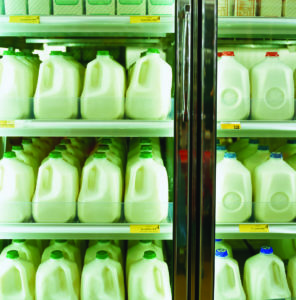 As COVID-19 spreads across the country, and as leaders enact different levels of restrictions, farmers are facing challenging times and consumers are doing their best to understand.
As COVID-19 spreads across the country, and as leaders enact different levels of restrictions, farmers are facing challenging times and consumers are doing their best to understand.
It’s difficult to read articles or view news reports about farmers disposing milk, eggs, vegetables and other crops and now, to hear about meat processing plants closing. Why is this happening?
There are a lot of questions surrounding this topic. Here is a list of resources to help dive deeper into the challenges facing farmers and consumers. Hopefully, you can share these with friends and family to help them understand the headlines.
- In a statement on COVID-19’s impact on farmers, Wisconsin Farm Bureau President Joe Bragger, said that we have entered unprecedented times as a society.
“Our farmers, especially our dairy farmers, are being served a big dose of the sad reality we are living in with the COVID-19 pandemic. With depressed prices the last five years, our farmers were already stressed financially. The confirmed reports of milk disposal and processors asking farmers to cut back their production has only amplified the pressure.” Read more.
- Pam Jahnke with Mid-West Farm Report provided an explanation for consumers about milk disposal. Jahnke summarized four contributing factors for why farmers are having to dispose of milk and then provided three excellent ways for consumers to help farmers and the ag industry so that food continues to be readily available for the consumers dinning table. Read more.
- Dairy farmer and blogger Dairy Carrie answered the question, Why are farmers disposing milk when the milk cooler is empty? She started by saying, “Like many of you reading this at first I couldn’t understand how it’s possible that some stores have empty dairy aisles, some stores are limiting how much milk you can buy and worst of all, some are going without and there is milk being wasted. But after talking to a few friends and thinking it through, I understand what is happening and I wanted to explain it to you.” Read her blog post here.
- In an informational video, Katie with Cow Comfort Inn Dairy described how COVID-19 is affecting the dairy industry. Why farmers are dumping milk and why we can’t just donate it? She shares her insight here: facebook.com/cowcomfortinn/videos/209390420508912.
- WFBF Director of Communication Sarah Hetke wrote an open letter to consumers about milk. “The cows are still making milk and dairy farmers are working every day to bring that milk to our grocery stores and ultimately the dinner table. Any shortages you see will only be temporary. The quick swing in consumers’ dairy product preference will continue to be a challenge, but there will always be more milk, cheese, yogurt and other dairy products made daily.” Read more.
- On April 11, The New York Times published an article by David Yaffe-Bellany and Michael Corkery. They explained that, “The closing of restaurants, hotels and schools has left some farmers with no buyers for more than half their crops. And even as retailers see spikes in food sales to Americans who are now eating nearly every meal at home, the increases are not enough to absorb all of the perishable food that was planted weeks ago and intended for schools and businesses.”
The authors added, “The widespread destruction of fresh food — at a time when many Americans are hurting financially and millions are suddenly out of work — is an especially dystopian turn of events, even by the standards of a global pandemic. It reflects the profound economic uncertainty wrought by the virus and how difficult it has been for huge sectors of the economy, like agriculture, to adjust to such a sudden change in how they must operate.” Read the article here.
- In a commentary by Department of Agriculture, Trade and Consumer Protection Interim Secretary Randy Romanski asked the public to “Be there for farmers; they are always there for you.”
Interim Secretary Romanski added, “We are privileged to live in a state that produces an abundance of nutritious, high-quality foods. From fruits and vegetables to milk and meat, Wisconsin agriculture is diverse and plentiful. You do not have to drive far in Wisconsin to see the farms and fields that feed us. Unfortunately, this pandemic has impacted the entire world and has the potential to cause disruptions to the food supply chain here in the Midwest.”
The Interim Secretary had four takeaways for ways that consumers can help farmers and the ag industry. Read more.
- Danielle Wiener-Bronner, a writer for CNN Business, wrote an article, ‘Why dairy farmers across America are dumping their milk.’ She says that, “Disposing of milk before it is delivered to processors and turned into dairy products. Recently, farmers have had to resort to milk dumping because of a precipitous drop in demand from schools, restaurants and other food service providers, which have been mandated to close their doors to stop the spread of the coronavirus pandemic. The sudden shift in demand means that dairy farms across the country have an excess of milk. Between 2.7 million and 3.7 million gallons of U.S. milk could be dumped per day as a result of the crisis, the Dairy Farmers of America, a major dairy co-operative, estimated. But farmers can’t just stop milking their cows.” Read more.
Marian Viney
 Marian Viney is a member of the public relations team with Wisconsin Farm Bureau. She is an active member in her community serving in a variety of roles on the school board, within her church and other organizations. Marian and her husband, Doug, live in Belleville with their two sons, Michael and Benjamin. Their oldest son is attending graduate school in Jena, Germany.
Marian Viney is a member of the public relations team with Wisconsin Farm Bureau. She is an active member in her community serving in a variety of roles on the school board, within her church and other organizations. Marian and her husband, Doug, live in Belleville with their two sons, Michael and Benjamin. Their oldest son is attending graduate school in Jena, Germany.


Leave a Reply